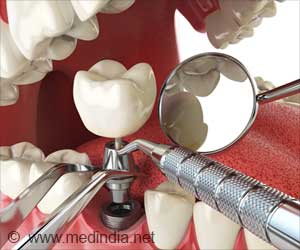Gum disease was linked to an increased rate of strokes caused by hardening of large arteries in the brain and also with severe artery blockages that haven't yet caused symptoms, stated new study.

‘Gum disease was more common in patients who had a stroke involving large blood vessels within the brain, yet not more common among those who had a stroke due to blockage in blood vessels outside the skull.’





"Gum disease is a chronic bacterial infection that affects the soft and hard structures supporting the teeth and is associated with inflammation. Because inflammation appears to play a major role in the development and worsening of atherosclerosis, or 'hardening' of blood vessels, we investigated if gum disease is associated with blockages in brain vessels and strokes caused by atherosclerosis of the brain vessels," said Souvik Sen, M.D., M.S., M.P.H., author of both studies and professor and chair of the Department of Neurology at the University of South Carolina School of Medicine in Columbia. Periodontal disease association with large artery atherothrombotic stroke (Oral Presentation 85) Researchers examined 265 patients (average age of 64; 49% white; 56% male) who experienced a stroke between 2015 and 2017, analyzing whether gum disease was associated with specific types of stroke.
They found:
Large artery strokes due to intracranial atherosclerosis were twice as common in patients with gum disease as in those without gum disease;
Patients with gum disease were three times as likely to have a stroke involving blood vessels in the back of the brain, which controls vision, coordination and other vital bodily functions; and Role of periodontal disease on intracranial atherosclerosis (Oral Presentation 136)
Advertisements
Researchers found:
Advertisements
People with gingivitis, inflammation of the gums, were twice as likely to have moderately severe narrowed brain arteries from plaque buildup compared to those with no gum disease; and
After adjusting for risk factors such as age, high blood pressure and high cholesterol, people with gingivitis were 2.4 times as likely to have severely blocked brain arteries.
"It's important for clinicians to recognize that gum disease is an important source of inflammation for their patients and to work with patients to address gum disease," Sen said The study excluded people who had gum disease serious enough to have resulted in tooth loss. "We are working on a current study to evaluate if treatment of gum disease can reduce its association with stroke," Sen said.
Source-Eurekalert















